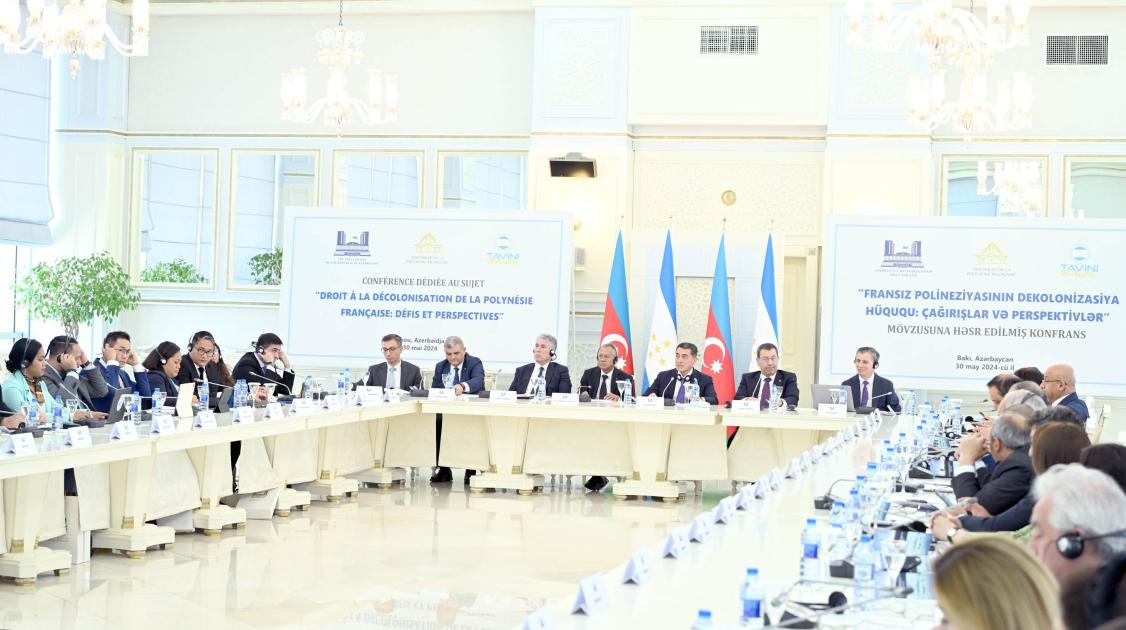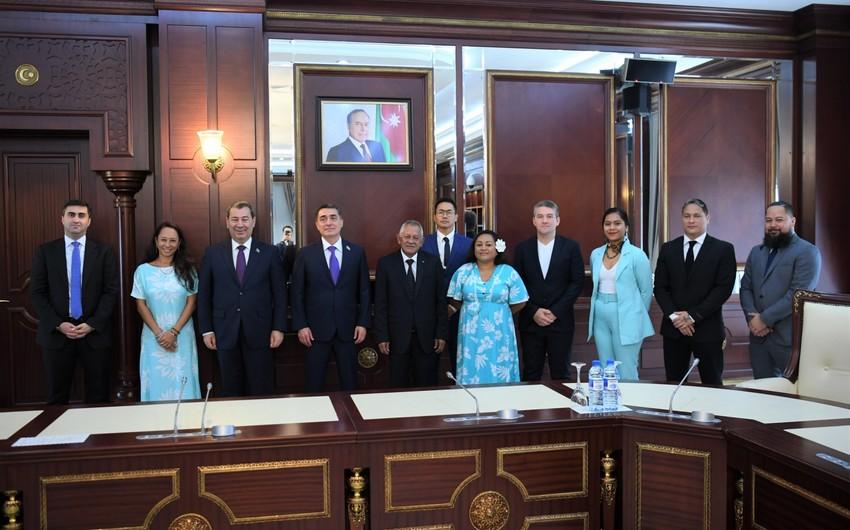Azerbaijan leads advocacy for colonial small island nations Baku conf focuses on French Polynesia
Azerbaijan has emerged as a vocal advocate for the rights of colonial small island nations, particularly those under French control. This commitment was highlighted during a significant conference held at the Azerbaijani Parliament on May 30, 2024, titled "French Polynesia's Right to Decolonization: Challenges and Perspectives". The event underscored Azerbaijan's leading role in supporting decolonization efforts and amplifying the voices of these oppressed regions.
Baku Initiative Group: A beacon of hope
The Baku Initiative Group (BIG), a pivotal organization in the fight against colonialism, in cooperation with the ruling Tavini party of French Polynesia, arranged the conference in the Azerbaijani parliament on 30 May to promote decolonization efforts of small colonial nations.
As BIG Executive Director Abbas Abbasov told the event, the group has organized eight international conferences to highlight the plight of territories suffering under colonial rule. Abbasov noted that Azerbaijan's influential position in international organizations, particularly its chairmanship of the Non-Aligned Movement (NAM), significantly contributes to global decolonization efforts.

A notable outcome of the May 30 conference was the memorandum signed between BIG and the Tavini party of French Polynesia. This agreement aims to foster cooperation not only politically but also in health and education. Abbasov criticized France for consistently boycotting UN decolonization events, further illustrating the ongoing struggle against colonial powers.
MP Zahid Oruj, Chairman of the Human Rights Committee of the Azerbaijani Milli Majlis (Parliament), addressed the conference with strong remarks against French colonialism. He lashed out at French Interior Minister Gérald Darmanin for his baseless accusations against Azerbaijan, which Darmanin claimed Baku mobilized 1,500 social media accounts against French colonial policies.
The parliamentarian retorted that Azerbaijan does not engage in covert operations or military support for distant island states. Instead, its efforts are rooted in moral and political support, which have alarmed French politicians and led to calls for severe actions against Azerbaijan.
“Concerned about our moral and political support, French politicians and allies are calling to confiscate Azerbaijan's financial assets, show their teeth against our country, and almost call for nuclear weapons to be used in the South Caucasus,” he noted.
Francois Bellamy, a European Parliament member, criticized Azerbaijan on social media, questioning his influence over France, Oruj said, adding that "those who demanded freedom for Karabakh are ready to suppress any force that touches their colonies and to destroy political and media freedom".
Zahid Oruj highlighted that BIG, established on July 6, 2023, in Baku, marks the beginning of a new wave against exploitation that has affected regions including the Caribbean, South America, and the Indian and Pacific Oceans for over 150 years.
"We believe that this movement will be successful and will finally give the oppressed peoples the freedom they deserve. By ending the 44-day war with victory, we have become a shining, unparalleled example for oppressed peoples around the world. The brilliant victory of Azerbaijan plays an important role in the revival of the Polynesian movement for independence. Neo-colonialism is doomed," he declared.
Azerbaijani MP Nizami Safarov highlighted that the decolonization discourse is far from over for many regions, including the 17 territories still experiencing colonialism. French Polynesia remains a stark example, with the French government only establishing a compensation commission for nuclear testing in 2010. Despite the devastating impact of these tests, including increased radiation-related illnesses, French President Emmanuel Macron has yet to issue an official apology.
Global advocacy & prospects
Victor Maamaatuaiahutapu, Secretary General of the Tavini party, expressed gratitude for Azerbaijan's support, which has reinvigorated their independence movement. He lamented that France continues to suppress their efforts to communicate their plight globally.
Maurea Tuaiahutapu, Chairman of the Budget and Financial Control Commission of the Assembly of French Polynesia, echoed this sentiment, thanking Azerbaijan for its solidarity and support.

Heinui Le Caill, Chairman of the Commission on Education, Youth, and Sports of the Assembly of French Polynesia, detailed the severe health consequences of France's nuclear tests. Despite significant financial expenditures on recovery, many affected individuals have died. Le Caill criticized France for using Polynesia as a testing ground to protect its own population, reflecting the deep-seated injustices of colonial policies.
The commitment to decolonization extends beyond French Polynesia. The Conference of the Parties (COP29) has pledged to continue advocating for small island states, a mission that has garnered support from global leaders like Barbados Prime Minister Mia Amor Mottley. This broader movement highlights the interconnectedness of climate action and decolonization, emphasizing the need for international solidarity.
Marania Vaianui, adviser on foreign relations to the vice-chairman of the Tavini Party, underscored the importance of adhering to UN General Assembly resolutions on decolonization. She called for global support to help French Polynesia achieve full sovereignty and access to its natural resources.

The Secretary General of the Tavini party, Victor Maamaatuaiahutapu, concluded by appealing for Azerbaijan's continued assistance in their political struggle and expressed confidence that Azerbaijan's support would help ensure justice and freedom for the people of French Polynesia.
Conclusion
Azerbaijan's proactive stance in advocating for the rights of colonial small island nations, particularly French Polynesia, underscores its leadership in the global decolonization movement. By providing a platform for oppressed voices and fostering international cooperation, Azerbaijan is playing a crucial role in challenging the remnants of colonial exploitation.
The ongoing efforts of the Baku Initiative Group and the unwavering support from Azerbaijani leaders exemplify a commitment to justice and self-determination for all colonial territories.








